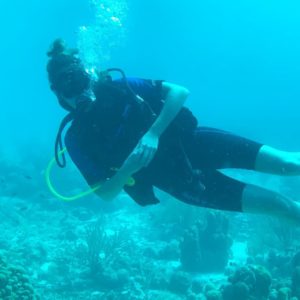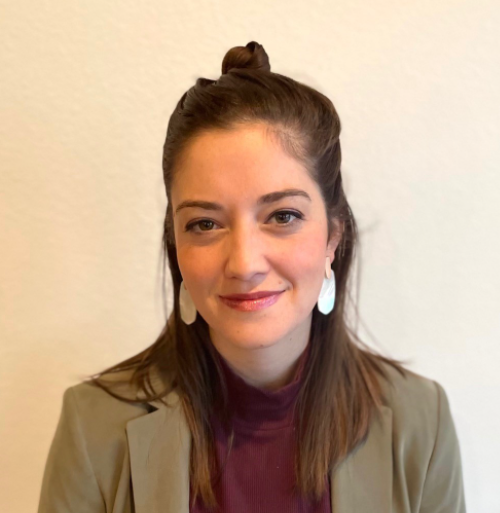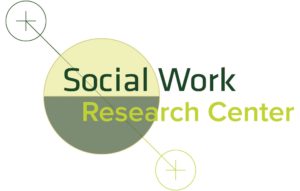 Casey Blackwatters (she/her) is a research associate in Colorado State University’s Social Work Research Center. Blackwatters holds an MPH in Health Behavior from the University of North Carolina at Chapel Hill.
Casey Blackwatters (she/her) is a research associate in Colorado State University’s Social Work Research Center. Blackwatters holds an MPH in Health Behavior from the University of North Carolina at Chapel Hill.
Blackwatters is also a recent recipient of the CHHS Research Day Public Health Category-Distinction in Graduate Research award for “Hey Buddy, Give Me Your Guns: Firearm Restrictions in Domestic Violence Protective Orders.”
Learn more about Blackwatters’ current work in community-based research, knowledge translation, and family strengthening.
What brought you to the Social Work Research Center?
“There weren’t a lot of things that I would consider ‘lucky,’ about 2020, but my arrival at SWRC was definitely one of them! In March of 2020, my husband and I decided to move to Fort Collins for the start of his Ph.D. program after I finished my Master of Public Health program in Chapel Hill, North Carolina. I graduated with my MPH in late May and immediately began seeking opportunities in the Northern Colorado area. Given my love for applied research, CSU’s various affiliated research centers and hubs were an obvious choice. SWRC immediately caught my eye with their focus on family wellbeing and strengthening.”
How did you become interested in social work?
 “The more time I spend in the public health sector, the more I realize how imperative interdisciplinary and cross-sector collaboration is to effective and equitable programming. Social work and public health share common themes: the importance of identifying and addressing social determinants of health in all our prevention programming, advocacy, and response work. For example, whereas a micro-track social worker may be an expert in the application of trauma-informed counseling, a public health professional may be an expert in supporting the broader implementation of a program intended to increase access to that trauma-informed counseling. By working across sectors, we can tackle health and wellbeing inequities holistically, from universal prevention programs, to targeted, secondary prevention programs, to harm reduction programming.”
“The more time I spend in the public health sector, the more I realize how imperative interdisciplinary and cross-sector collaboration is to effective and equitable programming. Social work and public health share common themes: the importance of identifying and addressing social determinants of health in all our prevention programming, advocacy, and response work. For example, whereas a micro-track social worker may be an expert in the application of trauma-informed counseling, a public health professional may be an expert in supporting the broader implementation of a program intended to increase access to that trauma-informed counseling. By working across sectors, we can tackle health and wellbeing inequities holistically, from universal prevention programs, to targeted, secondary prevention programs, to harm reduction programming.”
What are your research interests?
“Very broadly, I am interested in mental health promotion, maternal and child health, and in all the various intersecting research fields in injury and violence prevention. My interest in injury and violence prevention research stems from my passions for interdisciplinary collaboration, health equity, and intersectional feminism. To me, forms of injury and violence—for example, child maltreatment or intimate partner homicide—are symptoms of various, broader, oppressive practices and inequities like access to culturally-responsive and affordable primary care and childcare, health literacy, and income inequalities. I strive to challenge biases about disparities around issues like intimate partner violence and sexual assault, child maltreatment and neglect, and gun violence by redirecting conversations to upstream causes, like colonialism and racism in housing legislation. Within those fields, I have a passion for knowledge translation and strength-based approaches to public health and social work programming that leverage community assets and local knowledge.”
What’s your view on evidence-based practice in social work?
“As a public health professional, I strive to center evidence-based practices in everything that I do, from the way that I interact with stakeholders, to my approach to project management, to the way that I tackle research question refinement. But in my opinion, ‘evidence-based practice’ is simply the baseline for our work; it is equally as important to consider evidence in context. For example, let’s say that there is an evidence-based program which reduces depressive symptoms among new mothers that we are considering implementing and evaluating in Larimer County. Rather than accepting the evidence base at face-value, we need to consider: who does this program work for? Who might it be failing? What unintended consequences, if any, might this program entail? How might the population we intend to serve differ from the populations of previous evaluations? What historical factors might impact the implementation of this program? The public health and social work fields are experiencing important shifts towards anti-racist and anti-oppressive practices, and this shift requires intentionality on the part of all of us to examine not just our own biases, but the biases in the data we once deemed ‘robust.’”
What’s your favorite thing about CSU so far?
“Although I unfortunately haven’t been able to spend time on-campus yet, my favorite thing about CSU so far is the people that I’ve interacted with. Each and every CSU-affiliated individual that I’ve had the opportunity to connect with has been so proactive in ensuring that I feel welcomed, comfortable, and supported with my onboarding and learning. As soon as I joined SWRC, my calendar quickly filled with virtual coffee breaks and get to know you calls, and I’m incredibly grateful for the time everyone on my team has taken to make me feel welcomed.”
About the Social Work Research Center
 As a center in Colorado State University’s School of Social Work, the Social Work Research Center was established in 2004 to provide evidence-based research, practice, and policy in the child welfare, health/mental health, and juvenile justice domains. Our mission is to create university–practice partnerships that bridge the gap between research and practice, transform the human services landscape, and strengthen families and communities.
As a center in Colorado State University’s School of Social Work, the Social Work Research Center was established in 2004 to provide evidence-based research, practice, and policy in the child welfare, health/mental health, and juvenile justice domains. Our mission is to create university–practice partnerships that bridge the gap between research and practice, transform the human services landscape, and strengthen families and communities.
The School of Social Work is part of CSU’s College of Health and Human Sciences.